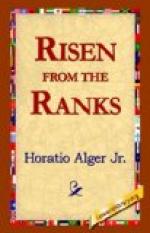“Thank you, Professor Henderson,” said Harry gratefully. “I appreciate your offer, even if I do not accept it. But I have made up mind to learn the printing business.”
“You are to enter the office of the ‘Centreville Gazette,’ I believe.”
“Yes, sir.”
“How much pay will you get?”
“I shall receive my board the first month, and for the next six months have agreed to take two dollars a week and board.”
“That won’t pay your expenses.”
“It must,” said Harry, firmly.
“You have laid up some money while with me, haven’t you!”
“Yes, sir; I have fifty dollars in my pocket-book, besides having given eighty dollars at home.”
“That is doing well, but you won’t be able to lay up anything for the next year.”
“Perhaps not in money, but I shall be gaining the knowledge of a good trade.”
“And you like that better than remaining with me, and learning my business?”
“Yes, sir.”
“Well, perhaps you are right. I don’t fancy being a magician myself; but I am too old to change. I like moving round, and I make a good living for my family. Besides I contribute to the innocent amusement of the public, and earn my money fairly.”
“I agree with you, sir,” said Harry. “I think yours is a useful employment, but it would not suit everybody. Ever since I read the life of Benjamin Franklin, I have wanted to learn to be a printer.”
“It is an excellent business, no doubt, and if you have made up your mind I will not dissuade you. When you have a paper of your own, you can give your old friend, Professor Henderson, an occasional puff.”
“I shall be glad to do that,” said Harry, smiling, “but I shall have to wait some time first.”
“How old are you now?”
“Sixteen.”
“Then you may qualify yourself for an editor in five or six years. I advise you to try it at any rate. The editor in America is a man of influence.”
“I do look forward to it,” said Harry, seriously. “I should not be satisfied to remain a journeyman all my life, nor even the half of it.”
“I sympathize with your ambition, Harry,” said the Professor, earnestly, “and I wish you the best success. Let me hear from you occasionally.”
“I should be very glad to write you, sir.”
“I see the stage is at the door, and I must bid you good-by. When you have a vacation, if you get a chance to come our way, Mrs. Henderson and myself will be glad to receive a visit from you. Good-by!” And with a hearty shake of the hand, Professor Henderson bade farewell to his late assistant.
Those who have read “Bound to Rise,” and are thus familiar with Harry Walton’s early history, will need no explanation of the preceding conversation. But for the benefit of new readers, I will recapitulate briefly the leading events in the history of the boy of sixteen who is to be our hero.




